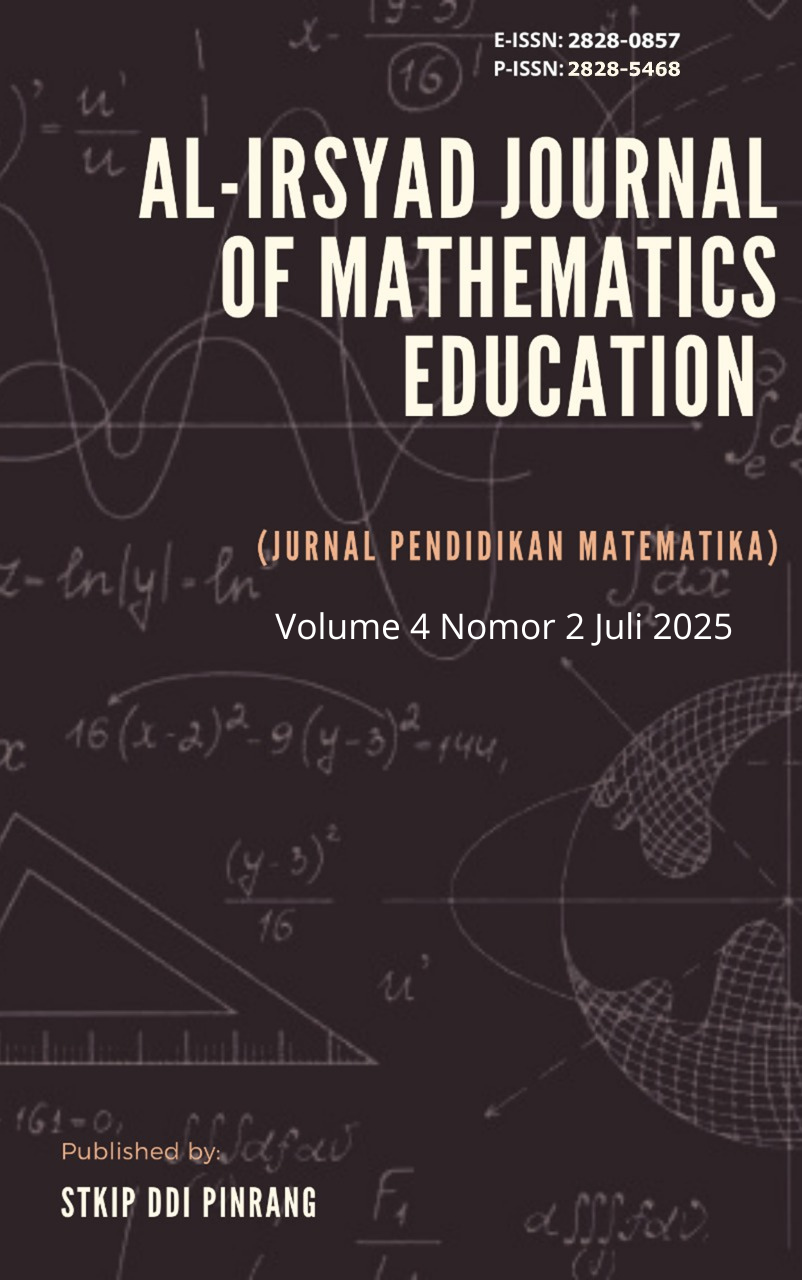TEACHING ALGEBRA THROUGH GAMES: A LITERATURE REVIEW
DOI:
https://doi.org/10.58917/ijme.v4i2.177Kata Kunci:
algebra, games, mathematics, game-based learningAbstrak
This systematic literature review investigates the application of game-based learning (GBL) in teaching algebra at the junior and senior secondary levels within the Indonesian education system between 2014 and 2024. The review synthesizes empirical studies written in both English and Indonesian, examining how digital and non-digital games have been used to support students' conceptual understanding, engagement, and problem-solving abilities in algebra. Out of an initial pool of approximately 3,000 studies, only 22 met the rigorous inclusion criteria, which focused on curriculum alignment, empirical design, measurable outcomes, and educational level. This selective scope ensures a focused and quality-driven synthesis of evidence relevant to the Indonesian context. Findings suggest that both digital platforms (e.g., Quizizz, Android-based games) and non-digital games (e.g., algebra-themed dominoes, board games) contribute positively to learning outcomes such as increased motivation, active participation, and deeper understanding of algebraic concepts. Game-based learning theory frequently underpins these interventions, highlighting the role of engagement and motivation in mathematical learning. Despite promising results, research gaps remain—particularly in the coverage of diverse algebraic topics and the long-term effectiveness of GBL approaches. This review underscores the potential of game-based strategies to enhance algebra instruction in Indonesia, while calling for broader and more methodologically diverse research in the future.
Referensi
Booth, A., Papaioannou, D., & Sutton, A. (2012). Systematic approaches to a successful literature review (2nd ed.). Sage Publications.
Cai, J., & Knuth, E. J. (Eds.). (2011). Early algebraization: A global dialogue from multiple perspectives. Springer.
Clark, D. B., Tanner-Smith, E. E., & Killingsworth, S. S. (2016). Digital games, design, and learning: A systematic review and meta-analysis. Review of Educational Research, 86(1), 79–122. https://doi.org/10.3102/0034654315582065
Gee, J. P. (2003). What video games have to teach us about learning and literacy. Palgrave Macmillan.
Ke, F. (2008). A case study of computer gaming for math: Engaged learning from gameplay? Computers & Education, 51(4), 1609–1620. https://doi.org/10.1016/j.compedu.2008.03.003
Malone, T. W., & Lepper, M. R. (1987). Making learning fun: A taxonomy of intrinsic motivations for learning. In R. E. Snow & M. J. Farr (Eds.), Aptitude, learning, and instruction (Vol. 3, pp. 223–253). Erlbaum.
Mullis, I. V. S., Martin, M. O., Foy, P., & Hooper, M. (2020). TIMSS 2019 international results in mathematics and science. TIMSS & PIRLS International Study Center.
Novrialdy, R. (2019). Pengaruh game online terhadap motivasi belajar siswa sekolah dasar. Jurnal Pendidikan Dasar, 10(1), 55–64.
OECD. (2019). PISA 2018 results (Volume I): What students know and can do. OECD Publishing. https://doi.org/10.1787/5f07c754-en
Papastergiou, M. (2009). Digital game-based learning in high school computer science education: Impact on educational effectiveness and student motivation. Computers & Education, 52(1), 1–12. https://doi.org/10.1016/j.compedu.2008.06.004
Piaget, J. (1972). The psychology of the child. Basic Books.
Sarji, N. A. (2021). Pengembangan media petualangan aljabar berbasis permainan edukasi untuk siswa SMP (Undergraduate thesis, Universitas Kristen Satya Wacana).
Stacey, K., & Chick, H. (2004). Solving the problem with algebra. In K. Stacey, H. Chick, & M. Kendal (Eds.), The future of the teaching and learning of algebra: The 12th ICMI Study (pp. 1–20). Springer.
Supriadi, N., Ramadona, K., Pratiwi, D. D., & Widyawati, S. (2020). Concept understanding and mathematic problem solving skills in algebraic materials: The effect of DragonBox game assisted DMR of COVID-19. Al-Jabar: Jurnal Pendidikan Matematika, 11(1), 33–44.
Teofani, R., Marzal, J., & Sofyan, H. (2020). Penerimaan game instruksional DragonBox Algebra 12+ pada pembelajaran aljabar berdasarkan teori Technology Acceptance Model (TAM). Jurnal Cendekia: Jurnal Pendidikan Matematika, 4(2), 819–828.
Vygotsky, L. S. (1978). Mind in society: The development of higher psychological processes. Harvard University Press.
Wicaksono, G., & Yunianta, T. N. H. (2022). Pengembangan game edukasi “Petualangan Alja” untuk melatih conceptual understanding dan procedural fluency siswa SMP materi aljabar. Satya Widya, 38(2), 43–52.
Yanuarto, W. N., & Hastinasyah, P. D. (2022). Gamification: Quizizz in mathematical game learning for secondary students. Indonesian Journal
Unduhan
Diterbitkan
Cara Mengutip
Terbitan
Bagian
Lisensi
Hak Cipta (c) 2025 Valeria Gusti

Artikel ini berlisensi Creative Commons Attribution 4.0 International License.






















